

Affordable and clean energy
Good health and well-being
Climate action
Decent work and economic growth
Zero hunger
No poverty
Sustainable cities and communities
Responsible consumption and production
Coordinator: Hochschule für Forstwirtschaft Rottenburg - Institut für Angewandte Forschung (IAF)
Contact: Prof. Dr. Stefan Pelz, Florian Empl
Address: Schadenweilerhof, 72108 Rottenburg a.N.
Phone.: +49 7472/951-235
Email: pelz(at)hs-rottenburg.de
Project partners in Germany/Austria:
- NOVIS GmbH
- AHT Gruppe, Overath
- Neyer Brainworks GmbH, Bludenz (Austria)
- Novis GmbH, Tübingen
- CONA Entwicklungs- & Handelsgesellschaft m.b.H., Voitsdorf (Austria)
Project partners in Ghana:
- University of Energy and Natural Resources (UENR), Sunyani, Ghana
- Oti Yeboah Complex Ltd.
- Abellon CleanEnergy Ghana Ltd.
- GreenWaterHut (NGO)
- Ghana Energy Commission
- Ghana Forestry Commission
Upgrading local markets through the use of biogenic waste products
Ghana is facing major challenges within the energy sector. While a few years ago, power cuts were commonplace due to falling water levels at hydropower plants, there is currently a surplus of electricity on account of imported fossil fuels. Together with other international partners, the Rottenburg University of Applied Forest Sciences (Hochschule für Forstwirtschaft Rottenburg, HFR) and its partner university, the University of Energy and Natural Resources in Sunyani (UENR), aim to create a sustainable counter-model: by developing and constructing a regional energy park with a view to providing an independent and stable supply of low-emission bio-energy, while at the same time supporting the local circular economy.
Current problems and proposed solutions
Ghana's electricity supply has changed significantly. While regular power cuts previously proved the main problem, the country is now facing a costly energy surplus accompanied by persistent grid instability. This problem is a consequence of climate change: falling water levels have resulted in a decrease in the productivity of hydropower stations, such as the Akosombo Dam, which alone accounts for approx. 20% of the country's generation capacity. In response, the government concluded long-term contracts on the import of fossil fuels, which have driven up energy prices for consumers. At the same time, plans for a sustainable energy supply (such as the Renewable Energy Master Plan - REMP) and the funding of corresponding projects have fallen by the wayside. The country has huge potential with regard to renewable energies, which must be utilised in the medium and long-term in order to achieve a clean, reliable and affordable energy supply.
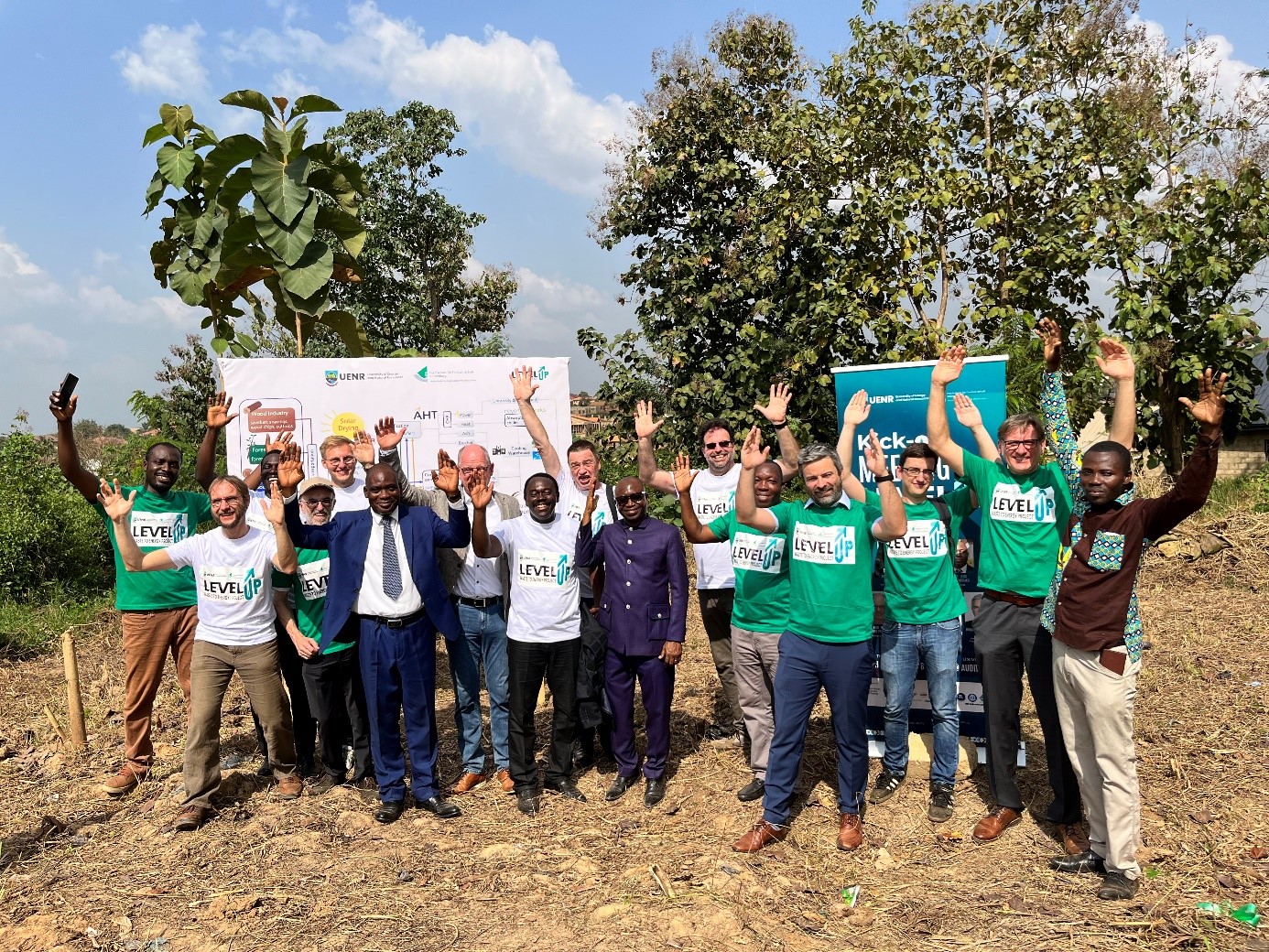
Against this backdrop, the Level-Up project is looking for sustainable and innovative solutions. An energy park is to make a wide range of products available on the basis of previously unutilised waste products from agriculture and forestry. Alongside the generation of electricity, the project team also focuses on the supply of cooling energy – a significant point in light of the fact that compression-based refrigeration machines account for 60-80% of power consumption in public and office buildings. There is also further need for refrigeration within the food production and storage industries, with a view to increasing local value. In addition, the project team has planned for a biogas plant, which will generate gas for cooking; this in turn aims to replace the hazardous practice of cooking over open wood fires, which is particularly prevalent in rural areas. Local farmers and forestry workers will also benefit: the energy park’s ash, biochar and digestates will be used to produce biological fertilisers, closing local nutrient cycles and improving soil quality.
The Level-Up approach
The factors that make the project's approach unique are the location, the variety of input materials and products, the comprehensive accompanying research and the modular technology system. The latter enables transferability as it allows operators to respond flexibly to different local conditions and requirements.
On the campus of the UENR in Sunyani, the project team will combine a solar biomass drying plant, a biomass gasifier with an associated combined heat and power (CHP) unit and an absorption refridgerator, which will obtain its energy from the CHP unit’s waste heat. The cooling energy will be used on-campus for cold chains in the natural sciences departments and the university clinic, while the generated electricity will ensure a stable power supply to the university campus. A second process chain consists of a wet fermentation biogas plant, which is adjoined to a constructed wetland and a composting system which will be operated in parallel. The biogas can either be used as gas for cooking, as an alternative to LPG or wood, or can be fed into the CHP unit. The compost will be combined with ash, biochar and the residual materials from the gasification process to produce an effective mineral-organic bio-fertiliser. This creates a closed system, in the sense of a circular economy, whereby modular components can be re-combined in a location-specific manner.
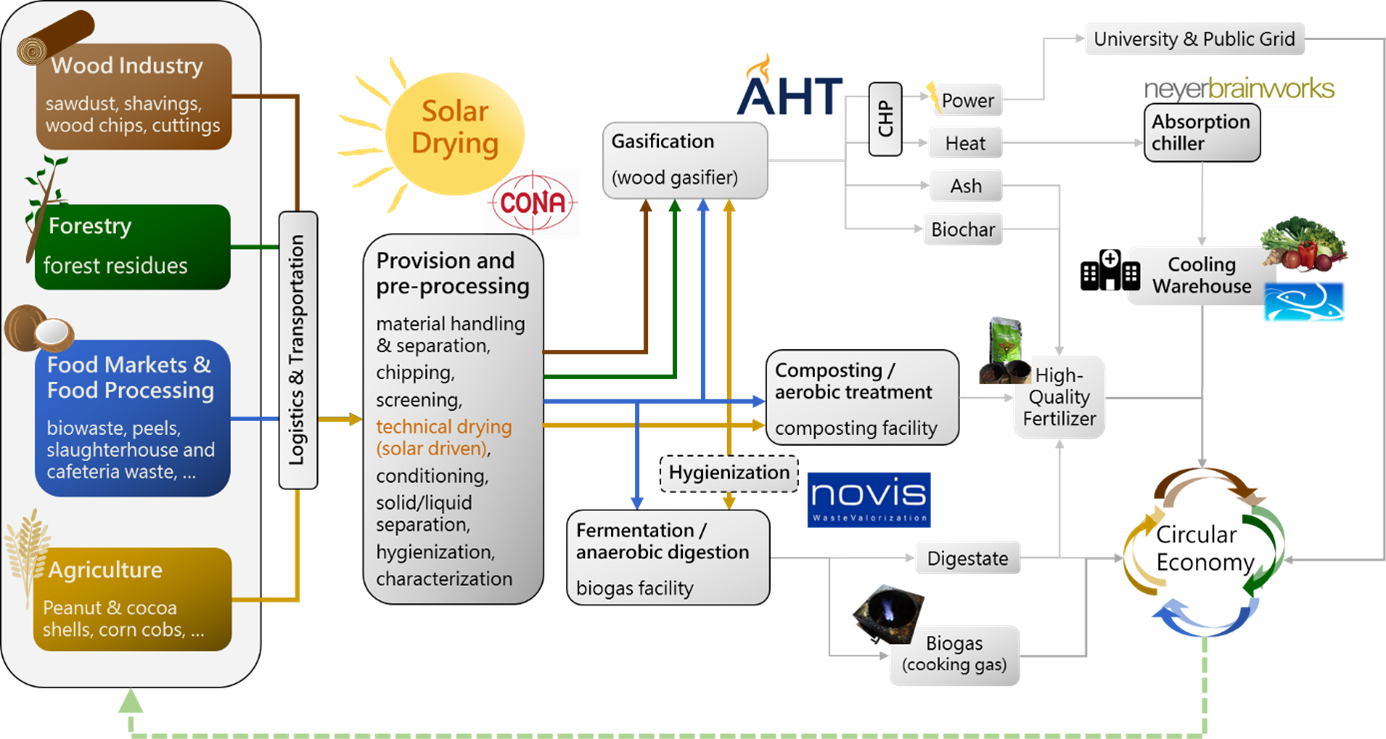
Long-term prospects
In addition to providing scientific support during the configuration, design and operation of the facilities, the project team will also develop modular training programmes for those operating the plants on-site. The plants will be transferred to a private-public partnership operator model, allowing the continued operation of the plants in future.
The project team has ensured it can reach its objectives by cooperating with project partners with international experience. The system is unique with regard to the composition of its components, and can be implemented at other locations in West Africa and beyond. To this end, the team will hold workshops for interested operators throughout the duration of the project.
Contribution to global sustainability objectives
The Level-Up project contributes to the achievement of numerous Sustainable Development Goals (SDGs):
- SDG 1: The creation of sustainable jobs, directly within the energy park and indirectly by providing raw materials from agriculture, forestry and the timber industry, electricity, fertiliser and refrigeration services (used by food processing businesses, for example) and by providing a source of income by establishing supply chains for the plant's raw materials.
- SDG 2: Provision of larger quantities of affordable organic and mineral-based fertilisers, resulting in an increase in productivity and promoting sustainable agriculture.
- SDG 3: The park will provide biogas as an alternative to the hazardous practice of cooking with wood; biogas burns cleanly and without leaving residue.
- SDG 7: Development of an adaptable, distributed and sustainable energy park to provide electricity, heat and cooling energy, which will serve as a template for transfer to other sites.
- SDG 8: Creation of jobs within the growth sectors of recycling and renewable energy, directly within the park and indirectly with (waste material) suppliers, in accordance with the circular economy model.
- SDG 9: Provision of an energy infrastructure, which will help establish manufacturing businesses in the immediate vicinity and does not depend on access to the grid. Major innovation and replication potential thanks to scientific support provided by the local university (UENR) and the international consortium.
- SDG 11: Contribution to viable waste management through the energy-related utilisation of previously unused biological waste materials, which are currently disposed of under critical conditions.
- SDG 12: Facilitation of agricultural value chains through cooling capacities, without the need to operate energy-intensive, compression-based refrigeration machines. Support for local processing businesses by creating added value: generation of recyclable products and energy from waste.
- SDG 13: Development of a flagship energy generation project with the aim of climate-neutral operation, and constituting a carbon sink by introducing biochar into agricultural processes. The project team further hopes to multiply this effect due to the transferablity of the modular system. Significant substitution of fossil fuels (diesel aggregates).
- SDG 15: On account of an increase in the productivity of areas used for agriculture and forestry, and the offer of alternatives to firewood (gas for cooking), the plant will help prevent future deforestation.
- SDG 17: Implementation of the project within a strong partnership with international companies, research institutions and participating local companies and institutions.
Level-Up: construction start for bioenergy park
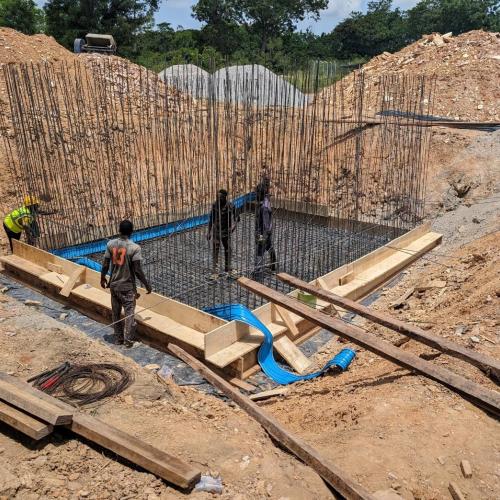
Level-Up: Mettler-Toledo GmbH supports bioenergy park by providing a pair of scales
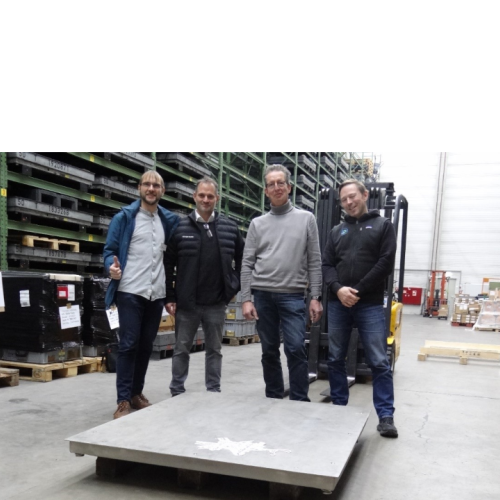
Level-Up: Hermann Sewerin GmbH provides gas analysis device
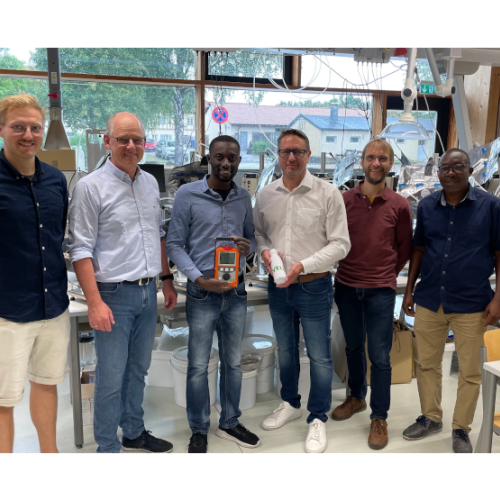
Project launch at Level-Up

